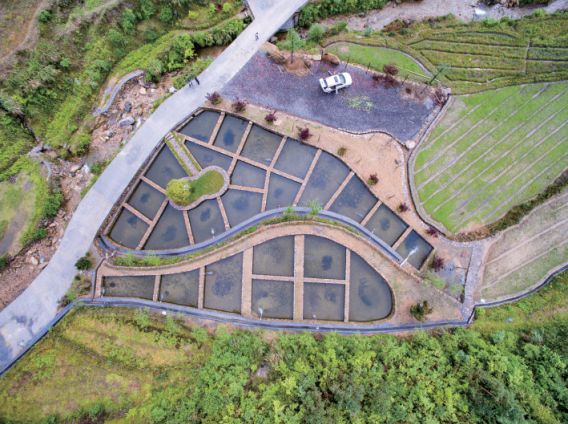Quzhou's fishery industry gains steam


A bird's-eye view of a fish-vegetable symbiosis ecological cycle site in Quzhou, Zhejiang province. [Photo/app.qz123.com]
Quzhou in Zhejiang province has in recent years been ramping up efforts to bolster its fishery industry.
Efforts encompass a range of initiatives, including the cultivation of leading enterprises, establishment of future fisheries parks, digital fishery zones, and aquatic product processing clusters.
As of 2023, the city's fishing area had expanded to 196,000 mu (13,066.67 hectares), with an aquaculture area of 138,000 mu. The total output of aquatic products reached 81,300 metric tons, with a total output value of 3.28 billion yuan ($458.38 million).
Each year, over 100 million various aquatic organisms are bred and released, reflecting the prosperity of Quzhou's fishing industry.
A notable innovation is the "fish-vegetable symbiosis" ecological cycle, a new model that combines intensive aquaculture with soilless cultivation. This approach involves water treatment processes that transform fish excrement and uneaten feed into nutrients for vegetables. The vegetables, in turn, purify the water, which is then recycled back to the fish pond.
Quzhou's fishery authorities are also actively promoting the deep processing of aquatic products, targeting new industrial opportunities and guiding enterprises to explore fine processing.
This includes collaborations with research institutions and universities to develop technologies in flavor restoration, nutritional preservation, and fresh-keeping of aquatic products, as well as the development of pre-made aquatic dishes.
Moreover, Quzhou has integrated the development of modern ecological fisheries with tourism, sightseeing, catering, entertainment, and business activities, thus promoting the emergence of new forms of fisheries. Fish-themed tourism has, in turn, become a unique attraction in the city's rural tourism.
MOST POPULAR
- 1 Foreign tourists to enjoy instant tax refund in China
- 2 China releases white paper on China-US economic, trade relations
- 3 China vows to help export enterprises
- 4 China will resolutely take countermeasures if US escalates tariff measures: commerce ministry
- 5 China's version of 'stock market stabilization fund' launched







